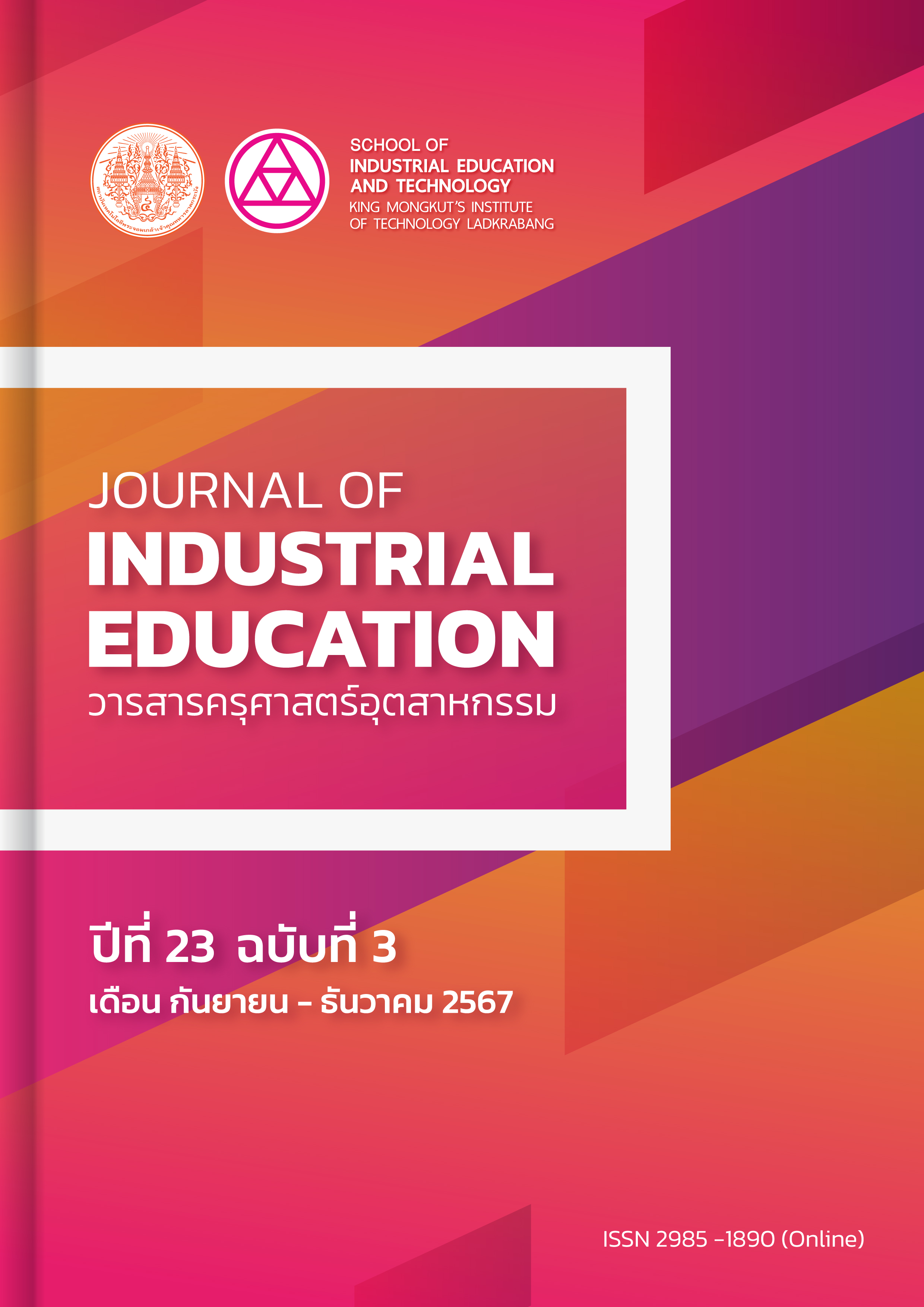THE EFFECTS OF USING PROBLEM BASED LEARNING TO PROMOTE CRITICAL THINKING SKILLS
DOI:
https://doi.org/10.55003/JIE.23311Keywords:
Problem based learning, Critical thinking skills, Python language, Computer programmingAbstract
The present research is the instructional model development to implement a problem-based learning for promoting critical thinking skills. The study aimed to investigate students’ learning achievement of a pre-test and a post-test and examine the critical thinking skills learned from developing the instructional model. The sampling groups were nine learning management and digital technology experts and twenty-eight students. The research instruments used were 1) The instructional model of a problem-based approach to improve the critical thinking skills evaluation form, 2) The achievement test, and 3) The critical thinking skills evaluation form. The statistics used were percentage, mean score, standard deviation, and t-test dependent. The results of the research were 1) The instructional model of a problem-based learning to developing critical thinking skills was at a good ( = 4.16, SD = 0.72), and Learning Unit No. 2, data types, was at the good level (
= 4.21, SD = 0.66). The next was Learning Unit No. 3, subprogram and other functions, which was at the good level (
= 4.20, SD = 0.78), and Learning No. 4, using data files, was at the good level (
= 4.15, SD = 0.71) respectively. However, Learning Unit No. 1, grammar structures of computer Languages of input-output commands, was at the lowest level (
= 4.08, SD = 0.72), 2) The mean score of students’ follow-up test was higher than the initial test at the statistically significant level of .05, and 3) The critical thinking skills of the sampling group improved from the developing instructional model were at a very good level of sixteen students (57 percent) and at a good level of twelve students (43 percent).
References
Barrows, H. S. (1986). A taxonomy of problem‐based learning methods. Medical Education, 20(6), 481-486.
Inchan, R. (2022). Designing teaching and learning activities by employing Project-Based Learning (PBL) to develop learning achievement in career subjects in high schools in Chiang rai. Journal of the Humanities and Social Sciences, Mahasarakham University. 41(2), 73-85. (in Thai)
Khaemmanee, T. (2013). Pedagogical science: Knowledge for an effective learning process (17th ed.). Chulalongkorn University press. (in Thai)
Khlaisang, J., & Koraneekij, P. (2019). Open online assessment management system platform and instrument to enhance the information, media, and ICT literacy skills of 21st century learners. International Journal of Emerging Technologies in Learning, 14(7), 111-127. (in Thai)
Lerdkhampom, T., & Duangwilai, D. (2024). The development of critical thinking ability and teamwork and collaboration competence using the problem-based learning with the simulation based learning for Grade 9 students. Dhammathas Academic Journal, 24(3), 147-160. (in Thai)
Liu, Y., & Pásztor, A. (2022). Effects of problem-based learning instructional intervention on critical thinking in higher education: A meta-analysis. Thinking Skills and Creativity, 45, 1-21.
Looi, H. C., Seyal, A. H., & Darussalam, B. (2014). Problem-based learning: An analysis of its application to the teaching of programming. International Proceedings of Economics Development and Research, 70(14), 68-75.
Luangnuan, S., & Lapanachokdee, W. (2020). Assessment approach in critical thinking skill by integrating problem base learning in social studies for Mathayom Suksa 3. Phuket Rajabhat University Academic Journal Volume 16(2), 58-76. (in Thai)
Nurkhin, A., & Pramusinto, H. (2020). Problem-based learning strategy: Its impact on students' critical and creative thinking skills. European Journal of Educational Research, 9(3), 1141-1150.
Ploysangwal, W. (2018). An assessment of critical thinking skills of Thai undergraduate students in private Thai Universities in Bangkok through an analytical and critical reading test. University of the Thai Chamber of Commerce Journal Humanities and Social Sciences, 38(3), 75-91. (in Thai)
Prommanon, N., & Art-in, S. (2022). The development of mathematical problem solving and critical thinking abilities using problem based learning with graphic organizers technique for Grade 7 students. Journal of Roi Et Rajabhat University, 16(3), 51-63. (in Thai)
Sirikitsathian, C. (2020). Effect of problem based learning to enhance learning outcomes on sufficiency economy subject. Phikun Journal, 18(2), 187-202. (in Thai)
Suwannoi, P. (2016). Problem-based Learning: PBL. https://ph.kku.ac.th/thai/images/file/km/pbl-he-58-1.pdf
Thampi, K. P. P. S., Ponathong, C., & Yongsorn, C. (2024). Critical thinking skills and dispositions: Perceptions of higher education students in Thailand. Journal of Education and Innovation, 26(3), 153-167. (in Thai)
Ulger, K. (2018). The effect of problem-based learning on the creative thinking and critical thinking disposition of students in visual arts education. Interdisciplinary Journal of Problem-Based Learning, 12(1), 1-19.
Wade, C. (1995). Using writing to develop and assess critical thinking. Teaching of Psychology, 22(1), 24-28.
Downloads
Published
How to Cite
Issue
Section
License
Copyright (c) 2024 Journal of Industrial Education

This work is licensed under a Creative Commons Attribution-NonCommercial-NoDerivatives 4.0 International License.
"The opinions and contents including the words in papers are responsibility by the authors."
"ข้อคิดเห็น เนื้อหา รวมทั้งการใช้ภาษาในบทความถือเป็นความรับผิดชอบของผู้เขียน"



